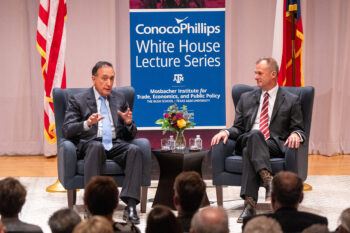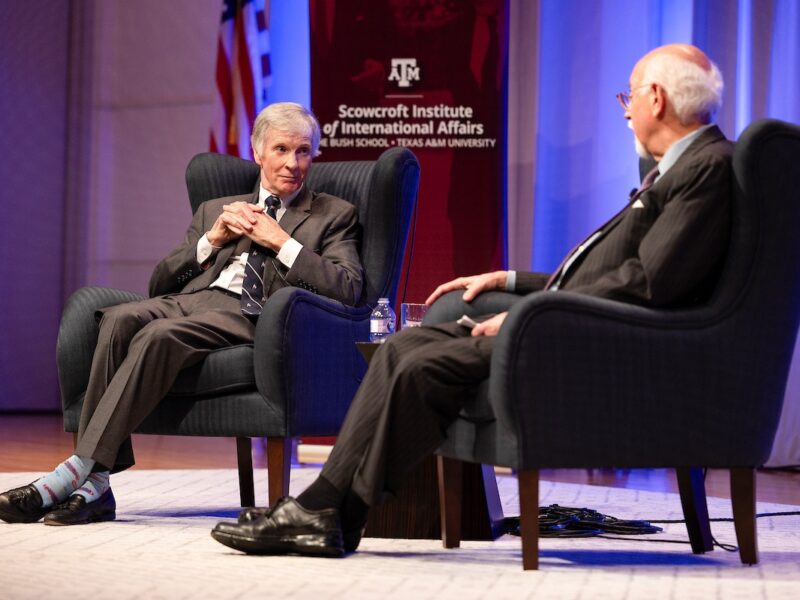Former HUD Secretary Provides Insight On The Status Of U.S. Infrastructure

The Mosbacher Institute at Texas A&M University hosted the 2023 ConocoPhillips White House Lecture featuring Henry Cisneros, the 10th U.S. Secretary of Housing and Urban Development and the former mayor of San Antonio, to discuss the critical role of modernized infrastructure. The ConocoPhillips White House Lecture Series brings to public attention the various White House and Executive Branch offices that provide policy, administrative and overall support to the president.
Cisneros spoke about the ways in which infrastructure influences economic growth and national security, emphasizing that this policy issue is at the heart of some of the most essential elements of American dynamics. Not only does infrastructure foster economic productivity and competition in the United States by generating new jobs and technological innovation, but it also contributes to the security of U.S. trade and strategic assets worldwide. In discussing historical commitments to infrastructure, Secretary Cisneros illustrated how infrastructure affects national pride and confidence, as it can represent either a sense of visible decline or visible progress.
To illustrate the importance of modernized infrastructure for the economy and national security, Cisneros discussed 18 categories of infrastructure graded by the American Society of Engineers, showing that transportation, large-scale mobility and clean water systems are critical issues impacting everyday American life. He asserted that changes in American infrastructure will define U.S. economic presence internationally, as high-speed rail, air cargo and capacity for large-scale ocean transport barges are at the forefront of international business and influence transportation costs, global accessibility and supply chain operations.
In discussing solutions to these critical infrastructure issues, Cisneros maintained that the recent Infrastructure Investment and Jobs Act has created “a golden moment for infrastructure, unlike anything we have seen in generations before.” This legislative commitment to infrastructure, along with new, creative financing strategies and public-private partnerships, has reinvigorated opportunities for economic growth, competitiveness, energy independence, and U.S.-based manufacturing.
In addition, Cisneros discussed the role of Texas A&M in this era of transformation, highlighting that the university generates a workforce critical to carrying out infrastructure roles and that the strategic location of Texas A&M as a part of the Texas Triangle will have important implications for population growth and global business. In closing, Cisneros stressed that infrastructure is now at the heart of almost every major public policy concern and that Texas A&M’s leadership responsibility is as acute as ever.
Following his speech, Cisneros sat down with Raymond Robertson, director of the Mosbacher Institute, for an on-stage Q&A discussion of his experience as HUD secretary and further thoughts on the recent bi-partisan infrastructure bill. Cisneros provided insight on his HUD initiatives regarding homelessness, minority homeownership and improving public housing conditions, and shared his thoughts on the importance of tapping into private sector resources to aid in the long-term success of infrastructure investment.
Media contact: Alexis Hickson, alexis.hixson@tamu.edu





